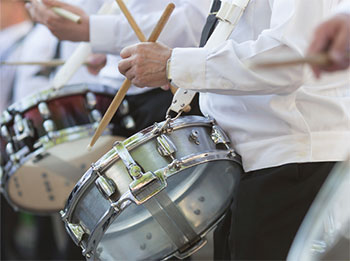Stirling research into sectarianism and public processions

The most comprehensive studies yet into sectarianism have been published, with University of Stirling research prominently featured.
Three Scottish Government-funded reports were presented to the independent Advisory Group on Tackling Sectarianism at a conference in Glasgow on Friday.
The Group had recommended the work, which covers attitudes and experiences of sectarianism, and the community impact of marches and parades in Scotland.
Minister for Community Safety and Legal Affairs Paul Wheelhouse welcomed the new reports, saying they would “undoubtedly play a huge part in influencing collective thinking and shaping how we tackle sectarianism going forward”.
Dr Kay Goodall, of Stirling Law School, led the ‘Community Experiences of Sectarianism’ project across five Scottish case study areas, working with colleagues from the Universities of Newcastle, Glasgow, Loughborough and Queen’s Belfast.
Findings included the belief that sectarianism occurred at specific places and times, such as public drinking, football matches and Loyalist and Irish Republican marches and a perception that men were more likely to be the instigators. The role of families and older generations in conveying beliefs, plus the sectarian significance in some areas of songs, clothing, school and names were also noted.
Education and tackling poverty were among solutions suggested by study participants, as well as local, rather than Scotland-wide, approaches. The report refers to the need for more open discussion in everyday life about what sectarianism is and where it remains, beyond the context of football, marches and parades.
Dr Niall Hamilton-Smith and Dr Margaret Malloch of the School of Applied Social Science, and members of the Scottish Centre for Crime and Justice Research, investigated the ‘Community Impact of Public Processions’.
While participants in Loyalist and Irish Republican marches held them to have significant meaning, the report found that the wider public often associated them with community and social problems and sectarianism.
Other findings included behaviour of procession supporters or bystanders, rather than participants, being residents and visitors’ chief concern. However, an analysis of police data did not reveal any notable increases or ‘spikes’ in antisocial/criminal behaviour after such processions. ‘Static’ demonstrations held by the Scottish Defence League and emerging Loyalist organisations were held to be problematic and disruptive for councils, Police Scotland and communities.
Drs Hamilton-Smith and Malloch said: "Scotland has a robust record of supporting freedom of expression and a rich and varied culture of parades, galas and political demonstrations.
“Significant progress has been made in recent years in planning, policing and stewarding processions effectively to minimise any disruption to communities. There are, however, still some significant challenges.
“This report highlights some of the existing good practice and makes a number of recommendations aimed at reducing the impact on local communities."
A third report by the ScotCen Social Research institute focussed on ‘Public Attitudes to Sectarianism’.
The independent Advisory Group on Tackling Sectarianism in Scotland is due to report later this year. While religiously aggravated offending is at its lowest level in a decade, the Group will incorporate findings from these new publications to advise the Scottish Government on future measures on tackling sectarianism.
Esther Hutcheson
Communications Officer
01786 46 6640
Notes for editors
- Background information
- The reports are available online:
'Community Impact of Public Processions'
http://www.gov.scot/Publications/2015/02/3769
http://www.gov.scot/Publications/2015/02/9505
'Community Experiences of Sectarianism'
http://www.gov.scot/Publications/2015/02/9920
http://www.gov.scot/Publications/2015/02/6496
'Scottish Social Attitudes survey 2014: Public attitudes to sectarianism in Scotland'
http://www.gov.scot/Publications/2015/02/5330
http://www.gov.scot/Publications/2015/02/6038
- The five case study areas in the ‘Community Experiences of Sectarianism’ study were: Dundee, Edinburgh, Glasgow, North Lanarkshire and the Western Isles.
- The Scottish Government has invested £9m over three years to tackle sectarianism.
School of Applied Social Science
The School of Applied Social Science is a large inter-disciplinary unit, combining teaching and research interests in Sociology, Social Policy, Criminology, Social Work, Dementia and Housing Studies. It was given the highest possible ratings for Sociology and Social Work in the most recent teaching quality exercises. The School is an Economic and Social Research Council recognised postgraduate research training centre, as part of the Scottish Graduate School. In the 2014 Research Excellence Framework, 75 per cent of its research was assessed as internationally excellent or world leading, with the top 24 per cent of its work judged as world leading. The School is also home to a number of specialist centres including the Scottish Centre for Crime & Justice Research (SCCJR), WithScotland (formerly MARS and SCCPN) and the Dementia Services Development Centre (DSDC).
School of Applied Social Science
Stirling Law School
Stirling Law School provides high quality professionally qualifying legal education through its Scots Law LLB degrees (accredited by the Law Society of Scotland and the Faculty of Advocates). It also offers innovative and popular multi-disciplinary BA Law degrees for those wishing a university education in law, but who do not intend entering the legal profession. As well as the Accelerated Graduate LLB, the School provides multi-disciplinary LLM programmes in specialist areas including finance, the environment and international commercial law. It also has a thriving PhD programme. Colleagues in the Stirling Law School are highly-regarded specialists in their areas of research and teaching, and publish widely in scholarly books and leading academic journals. Law School research also has an impact beyond academia, contributing to policy development and the law-making process. Wide-ranging research specialisms span from Commercial Law and European Law, to Discrimination Law and "Hate" Offences.
